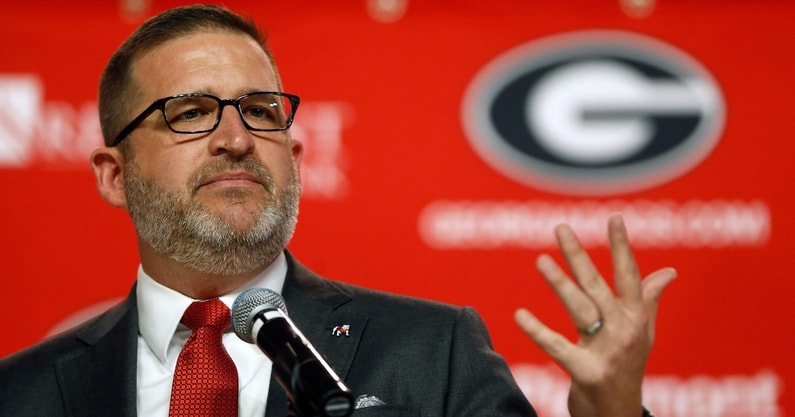Georgia AD Josh Brooks: SEC needs clarity on selection process for 16-team College Football Playoff

Georgia athletic director Josh Brooks claimed the SEC needed clarity of the 16-team selection process if they and others want to move forward. Expansion is likely inevitable for 14 or 16 teams in the College Football Playoff.
Basically, Brooks wants to know how the CFP committee will decide the playoff teams. There have been models thrown out there where some conferences get more auto bids than others or you go to the 5+11 model.
That would make it five conference champions, the highest ranked ones anyway, and then 11 at-large bids from the remaining highest ranked teams. With a straight seeding model in the 12-team iteration this year, an expanded playoff would likely use something similar, if not the same thing.
“If we were to go to 16, there’s arguments we made about four-four this and that, but then you look at and go 5 and 11, we’ve had a glut of teams in that 13 and 16 range,” Brooks said on Sirius XM. “If we trust the committee to hold true, and historically you look at the top 16 over the last 10 years and say, ‘Man, we’d be averaging five or six a year, we’d be in good shape.’ But you would ask the committee that, okay, now that it’s 16 for ranking, don’t start having new criteria … You want to hold true to that.
“But I think what we’ve got to fix first before we talk about nine games, eight games, or 4, 4, 3, 2, 1, whatever, we got to get down to the root of the problem and really talk about how we’re going to decide whether it’s 12 teams, 14, teams, how are we deciding?”
Top 10
- 1New
Top 25 College QBs
Ranking best '25 signal callers
- 2
Top 25 Defensive Lines
Ranking the best for 2025
- 3
Big Ten Football
Predicting 1st loss for each team
- 4Hot
College Football Playoff
Ranking Top 32 teams for 2025
- 5Trending
Tim Brando
Ranks Top 15 CFB teams for 2025
Get the Daily On3 Newsletter in your inbox every morning
By clicking "Subscribe to Newsletter", I agree to On3's Privacy Notice, Terms, and use of my personal information described therein.
Brooks also acknowledged strength of schedule plays a big factor in College Football Playoff discussions. The SEC and Big Ten can certainly attest, which is why there’s an outcry for the SEC to play an additional conference game on their schedule. Brooks opened up the debate, again, what’s better? A bad win or a good loss?
“Because there’s still some frustration with a bad win being better than a good loss,” Brooks said. “And I know that’s a variable … But now, if we’re not in (the SEC Championship) or if we play, if we’re playing a lower tier win, or if you play an easier schedule, if you don’t play a Clemson or Oregon like we have in the past, when we get a better advantage versus playing a weaker schedule, with a true look at strength of schedule, a true look at quality wins and quality losses, to really evaluate that.
“It’s hard in football, because there aren’t as many data points. That’s hard, but there are things like RPI and things we can look at, to really look at a combination of the metric score that we can bring to the committee and say, ‘These are the best teams. But can you do that from a conference room watching football games? Do you need to go to some games in person? Do you need people that live and breathe and see it every day? I don’t know what that right makeup is.”